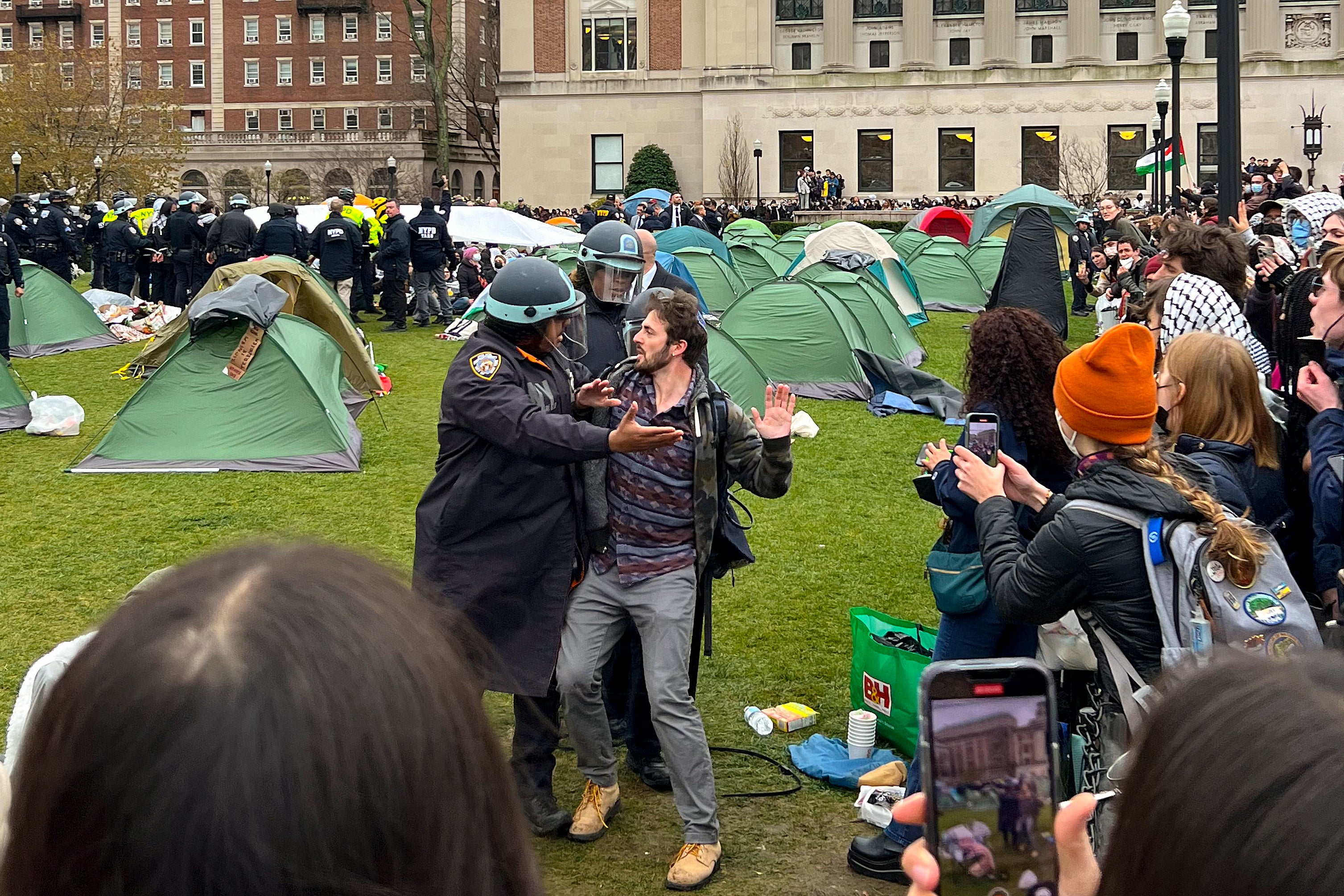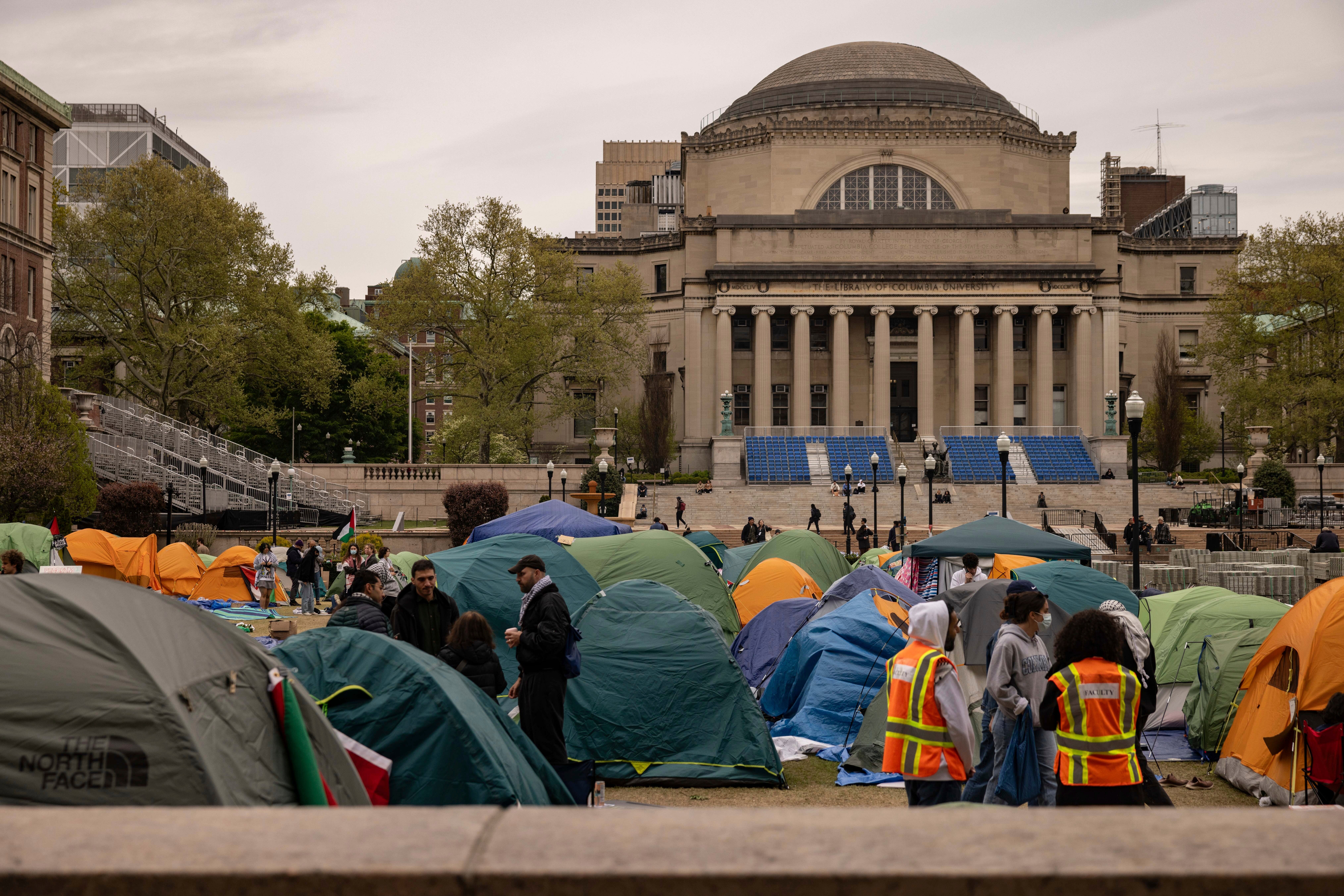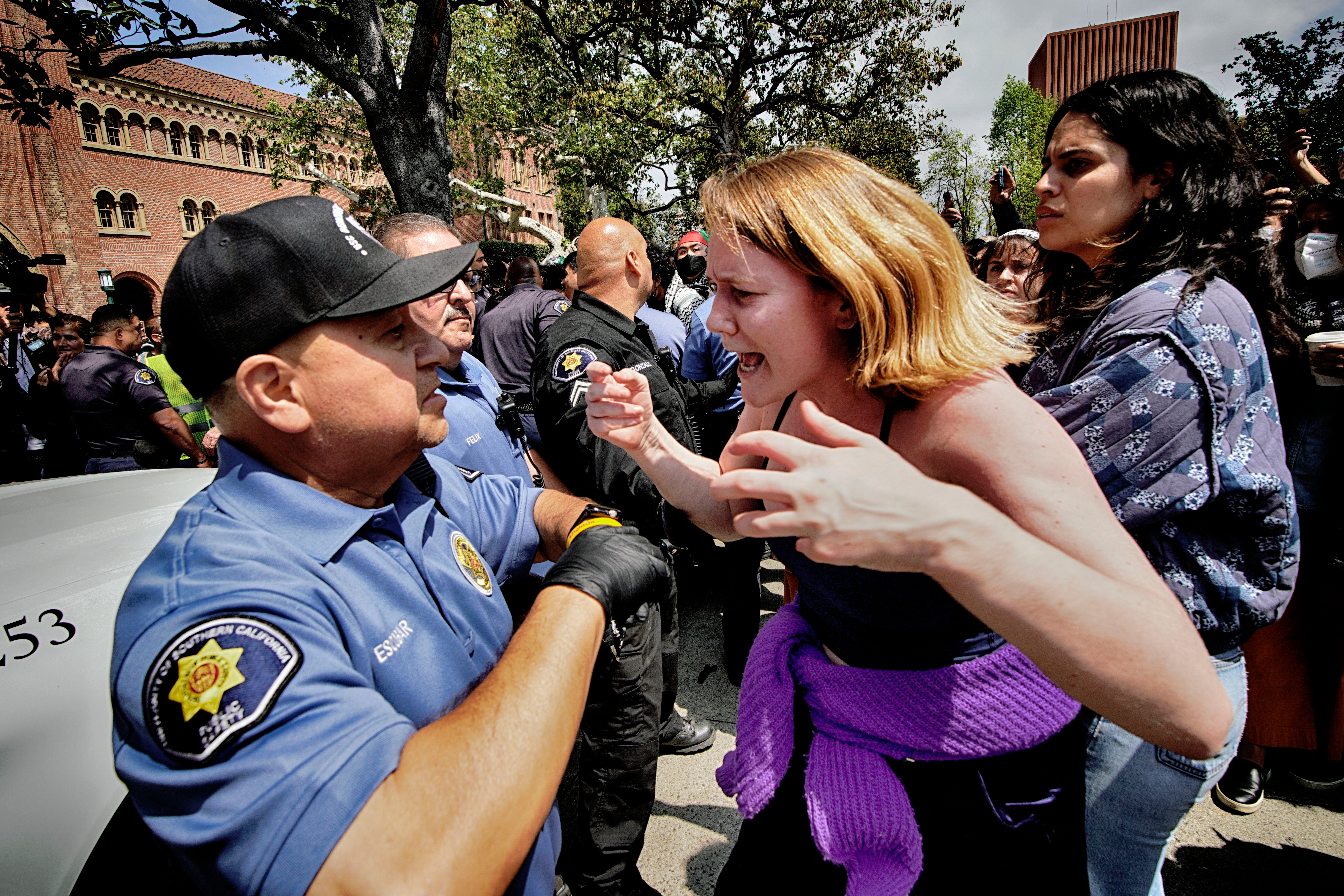Universities should not be bullied by politicians into cracking down on pro-Palestine protests
As hundreds of NYPD officers storm Columbia University’s campus and detained a numer of Pro-Palestinian protesters who were occupying one of the building, human rights lawyer Eric Lewis examines how universities are struggling to allow students to show dissent


When I was an undergraduate, we marched about divestment from companies doing business in apartheid South Africa and exploitation of textile workers in the American South. The moral issues seemed clear even if our depth of understanding of the issues was not great. Apartheid fell and textile jobs moved to Asia; I suspect our protests had negligible impact, but we did our part and finding political consciousness was also part of our becoming adults.
I suspect the administration knew that by the time warm weather and exams rolled around, the protests would peter out, awaiting next spring’s causes and marches. One year, a few hundred students took over the historic main administration building, slept uncomfortably all night and left the next day, fists raised and chanting loudly.
Student stringers, working for various newspapers, were able to get a few column inches in the next day’s papers. Various mild disciplinary measures were imposed, although there seemed to be a view that civil disobedience should be praised and that imposing discipline was morally unacceptable.
In the ensuing decades, the issues are perhaps more complex and urgent. The massacres of innocent people and the taking of hostages on 7 October were abhorrent and a grave breach of international law. Also abhorrent is the killing of 30,000 or more Palestinian civilians, many of whom were children.
One does not, cannot, justify the other. Murdering and raping civilians and using human shields are crimes against humanity, not just against Jews. Retaliation is never permitted in international law, even if the first blow struck was grotesque. Disproportionate civilian casualties are not acceptable to achieve a military objective.
Were more civilians killed indiscriminately in the bombing of Dresden, the rape of Nanking, the dropping of nuclear bombs on Hiroshima and Nagasaki? Certainly, that is the case. Does the fact that the evil Nazi regime was running an extermination campaign justify indiscriminate bombing of civilians? It certainly may explain the underlying rage but it does not provide a moral or legal justification. The Geneva Conventions enacted after the Second World War showed that the international community tried to bring some limits to warfare and to prevent the recurrence of further horrors. An eye for an eye is not a valid principle in a civilised international order.

Which brings us to college campuses today. Much has changed; social media has both turbocharged and disinhibited the speakers. And our political culture bears the background hum of threats of imminent violence. But as ever, the first amendment protects speech broadly; the right is not unlimited. It has long been the law that governments or private entities like universities can impose reasonable time, place and manner restrictions. In addition, certain messages are considered “verbal acts”, like yelling fire in a crowded theatre or inciting a mob to violence.
There are rules of the road that must be observed to allow peaceful protest without violence, incitement or disrespect for the dignity and personhood of those with whom we disagree. Not every pro-Palestinian is an antisemite; not every pro-Israeli supports violence against Palestinians. While people on one side may find the views of others offensive or even loathsome, this cannot permit shutting down the rights of people to express many if not all such messages.
Students should be exposed to a variety of viewpoints, even viewpoints that upset them. They have a right to be protected from threats and violence, but not to be protected from political speech. Intensity of feeling, moral outrage, historical legacies of victimhood, virtue signalling, group cohesion – all of these powerful motivators of frequently illegal conduct – do not justify that conduct. And there must be accountability for conduct that crosses that line. However, accountability must be administered based on neutral, clear rules applied in a content-neutral manner.
So pro-Israel demonstrators have every right to march in defense of the safety, security and rights of the Israeli state and its people. They have the right to denounce Hamas as a terrorist organisation. They can claim that Israel should have the right to all of Greater Israel, including Judea and Samaria – from their river to their sea. They cannot resort to violence or encourage or incite violence against Palestinians. They cannot threaten violence against those with whom they disagree. They can call 7 October a genocide, whether it is or is not under international law. Not all speech needs to be accurate; it just cannot threaten or harm or incite others.

So too, there are rules of the road for pro-Gaza demonstrators. They cannot call for violence against Jews. They cannot threaten Jewish students on campus or use physical violence. They cannot threaten a new Holocaust. They can call for an independent Palestine. They can call for a Palestine from the river to the sea, but they cannot call for the violent destruction of Israel to achieve it. They cannot call for the killing of hostages. They can call the current invasion a genocide, again, whether it is or it is not. Just as pro-Israel protesters cannot threaten or harm Palestinians or Muslims, so too pro-Palestinian protesters cannot threaten or harm Israelis or Jews.
The protests at the New York university have been going on for weeks, sparking similar demonstrations at some 50 campuses across the country. Yesterday hundreds of NYPD officers stormed the campus of Columbia University to take back control of a building seized by pro-Palestine protesters. Dozens of student protesters are thought to have been detained after police were seen entering an upper storey of Hamilton Hall – renamed Hind Hall by protesters in memory of a six-year-old Palestinian girl killed in Gaza in January.
Sadly, politicians are wading into this difficult and fraught situation to score political points and blame university officials no matter what they do – for arresting students, for evicting students, for negotiating with students, for trying to calm things down or set parameters. Alumni can threaten to withdraw financial support.
But the parameters of what universities should do are there in the constitution. Universities have the right and the obligation to allow dissent, but that can be reasonably limited in time, place and manner. Dissent must be non-violent; it cannot encourage or condone violence and must respect the dignity of all members of the community. Jews must be safe; Muslims must be safe; both groups must behave responsibly. And universities and others cannot be bullied into suppressing speech based on point of view.
Every person and group wants to be vindicated in their viewpoints and values, but the most and the best that can and should be done is to allow dissent within reasonable bounds. University administrators should try to calm things down; resorting to mass arrests as a first or even second step is unlikely to do so. At some point, universities can and should take steps to prevent deterioration into violence and chaos.
But universities must be careful not to treat those who advance different viewpoints differently. They must ensure they are not being bullied by politicians and alumni into taking actions that aggravate rather than ameliorate problems at their campuses and nationwide. The war in Gaza will not be resolved on college campuses; but the values of tolerance, respect and freedom of speech are now very much in the balance.
Eric Lewis is a human rights lawyer who sits on the board of The Independent






Join our commenting forum
Join thought-provoking conversations, follow other Independent readers and see their replies
Comments